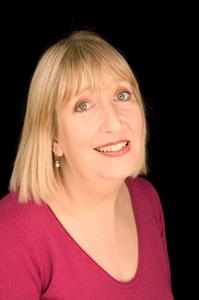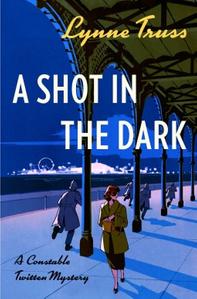 Lynne Truss is an author, dramatist, columnist and broadcaster who's written numerous works of fiction and nonfiction, including the bestselling book on punctuation Eats, Shoots and Leaves. She lives on the South Coast of England with two Norfolk Terriers. A Shot in the Dark (Bloomsbury, November 6, 2018) is the first in her Constable Twitten mystery series.
Lynne Truss is an author, dramatist, columnist and broadcaster who's written numerous works of fiction and nonfiction, including the bestselling book on punctuation Eats, Shoots and Leaves. She lives on the South Coast of England with two Norfolk Terriers. A Shot in the Dark (Bloomsbury, November 6, 2018) is the first in her Constable Twitten mystery series.
On your nightstand now:
There's quite a pile right now. I keep being distracted from pleasure reading! But I'm looking forward to Kate Atkinson's Transcription and William Boyd's Love Is Blind. Also in the pile is a lovely book called Girls Will Be Girls (1974) by the British humorist Arthur Marshall. It's about the appeal of school stories from the first half of the 20th century. I'm playing with the idea of creating a character based on a writer like him in one of my upcoming Twitten mysteries (which are set in 1957), but if it comes to nothing, that's fine. I also just like reading his kind of prose.
Favorite book when you were a child:
The Golden Treasury of Poetry, edited by Louis Untermeyer (1959 in the U.S., 1961 in the U.K.). There was a copy at school of this beautiful hardback book, and acquiring it for a birthday in the mid-1960s was one of the great moments in my life. The fact that it was essentially an American collection didn't occur to me for years, despite giveaway poems about Bunker Hill! I learned long narrative poems from it and recited them in front of bored classmates. I can still recite "How They Brought the Good News from Ghent to Aix" by Robert Browning (first verse anyway). I also still have the copy from my childhood.
Your top five authors:
This is too hard! Chekhov is right up there for me; also Jane Austen and Evelyn Waugh. Dickens has lost his charm for me in recent years, which is sad. Of modern writers, Alice Munro and Margaret Atwood are outstanding. But I always hesitate about naming my top writers, as it just shows my limitations as a reader! There are any number of great(er) writers I maybe haven't read yet.
Book you've faked reading:
I'm not good at faking, and I have a naïve belief that admitting deficiencies is the best policy anyway (see above). With unread books, I can often honestly say "Well, I did start it, but then something interrupted"--because this happens to me all the time. As a writer, of course, it's very common to come across other people (interviewers, particularly) pretending to have read one's books, and it's very painful having to play along. I'd far rather people admitted that they hadn't bothered.
 Book you're an evangelist for:
Book you're an evangelist for:
I recently discovered the short stories of John O'Hara (1905-70), who isn't as well known in the U.K. as he is in the U.S. I have begged people to buy his Selected Stories; I have urged them. The novella Pal Joey (1940) is a masterpiece; I would love to present a program about him for the radio, to incorporate readings from it. However, the trouble with O'Hara (it transpires) is that as a person he was thoroughly obnoxious. One of his New Yorker contemporaries said quite seriously that O'Hara would never get a fair assessment as a writer until the last person who'd ever met him was dead.
Book you've bought for the cover:
Ooh, too many to name. I do like a good cover; I also care about typeface and point size: if a book is too densely printed, I discard it mercilessly. But generally I am hugely impressed by book design these days, having first started buying books in the 1970s when book design was, generally, absolutely dreadful.
Book you hid from your parents:
I don't remember hiding books, but then my parents weren't very curious about what I was reading. Or maybe I have suppressed the memory. I do remember the obverse, actually: of finding a book tucked under my dad's side of the marital bed that had a graphic description of sex in the opening paragraph. Was it perhaps Alfie by Bill Naughton (novelization of the famous film starring Michael Caine)? Anyway, I certainly wish it had remained undiscovered. I never saw my dad in the same light after that, and writing about this reminds me to sign up for therapy again quite soon.
Book that changed your life:
Probably Usage and Abusage by Eric Partridge (first published in 1942, but oft-revised), which I bought when I was in my teens. It was what I now know to be a style guide, but at that age I knew no other books like it, and I just loved it for its wit and authority on matters (of writing) that I'd never thought about. It had a section on "similes, battered," which Partridge advised his readers to think twice before using. These included "as sharp as a razor" and other similes I recognized as over-used, but also obsolete ones such as "as merry as a grig" and "as right as a trivet." The cover image of my Penguin edition I didn't understand as a visual pun until decades after I bought it: it depicts a candle being burned at both ends.
Favorite line from a book:
It's slightly more than one line, but how about the following from Stella Gibbons's Cold Comfort Farm (1932)?
"The trout-sperm in the muddy hollow under Nettle Flitch Weir were agitated, and well they might be. The long screams of the hunting owls tore across the night, scarlet lines on black. In the pauses, every ten minutes, they mated. It seemed chaotic, but it was more methodically arranged than you might think."
Five books you'll never part with:
The Louis Untermeyer poetry anthology mentioned above; Decline and Fall by Evelyn Waugh; Alice's Adventures in Wonderland by Lewis Carroll; The Penguin Complete Sherlock Holmes; Ghost Stories of an Antiquary by M.R. James.
Book you most want to read again for the first time:
Persuasion by Jane Austen--or possibly anything else by Jane Austen. Her brilliance doesn't wear off (far from it), but it would be wonderful to encounter it completely fresh again.

